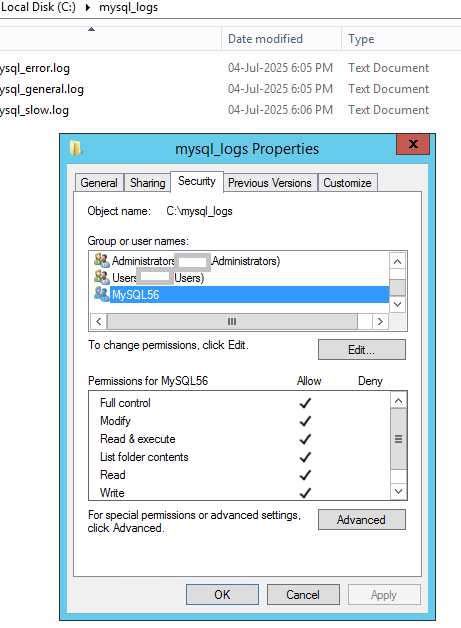MySQL 5.6 not writing any logs
-
September 2, 2025 at 5:24 am
We are using MySQL version 5.6 in our Windows Server 2012 R2 environment. We have enabled the error, general & slow logging in the config file, but the logs are not being written even in case of errors. The below is a snippet from the ‘my.ini’ file:
# Commented lines aren’t included
[mysqld]
sql_mode=NO_ENGINE_SUBSTITUTION,STRICT_TRANS_TABLES
log_error = "C:\Program Files\MySQL\MySQL Server 5.6\Log\error.log"
slow_query_log = 1
slow_query_log_file = "C:\mysql_logs\mysql_slow.log"
long_query_time = 2The MySQL is not directly managed, rather it is managed by Plesk Obsidian version 18.0.56 Update #4 ( Web Abmin Edition), as it was installed as a component of Plesk. As a result, we are unable to change any permissions to folder, such as providing ‘Full’ permission for the MySQL account through the mysql command line. We have given Full permissions through the Windows NTFS folder permission but still not working.

The troubleshooting steps tried by us are :
1. Checked whether the intended log file is present in the path before mentioning it in the my.ini file.
2. Restarted the mysql services after modifying the config fil.e
3. Checked the permissions to the folder in which the intended log file path resides, after coming across this link. The logs are not writing even after giving full permission as mentioned above.
4. Replaced the entry for the file path by removing the double quotes , replacing with single quotes, checking for any inadvertent spaces.
5. We have also added SET global general_log = 1; but logs are still not being written.
6. After every changes to the ‘my.ini’ we have restarted the MySQL service and checked.
Please assist us in resolving the issue. If any further information required then do let me know.
Thank you.
-
September 3, 2025 at 6:10 am
Thanks for posting your issue and hopefully someone will answer soon.
This is an automated bump to increase visibility of your question.
-
September 5, 2025 at 4:23 pm
I would recommend you reach out to Plesk Obsidian. It could be that their installer changes the default config file for MySQL or possibly even passes the configuration straight through the command line during instance startup.
OR are you sure that you understand what should be in the error log for the MySQL side of things? That will NOT store any errors related to Plesk Obsidian, but it will store errors related to MySQL. Do you know what errors MySQL is throwing that it should be capturing but isn't?
An error in Plesk Obsidian (which you say is a web thing, so a 503 error for example) will NOT show up in a MySQL error log. According to the MySQL docs:
The error log contains a record of mysqld startup and shutdown times. It also contains diagnostic messages such as errors, warnings, and notes that occur during server startup and shutdown, and while the server is running. For example, if mysqld notices that a table needs to be automatically checked or repaired, it writes a message to the error log.
The other thing to check is for duplicate values in the my.ini file. MySQL doesn't like duplicate values in the config file and will only follow the last one.
Also may not hurt to reach out to Plesk Obsidian to see if there is an update. MySQL 5.6 is pretty old - it came out in 2013. Might be time for an upgrade...
The above is all just my opinion on what you should do.
As with all advice you find on a random internet forum - you shouldn't blindly follow it. Always test on a test server to see if there is negative side effects before making changes to live!
I recommend you NEVER run "random code" you found online on any system you care about UNLESS you understand and can verify the code OR you don't care if the code trashes your system.
Viewing 3 posts - 1 through 3 (of 3 total)
You must be logged in to reply to this topic. Login to reply
